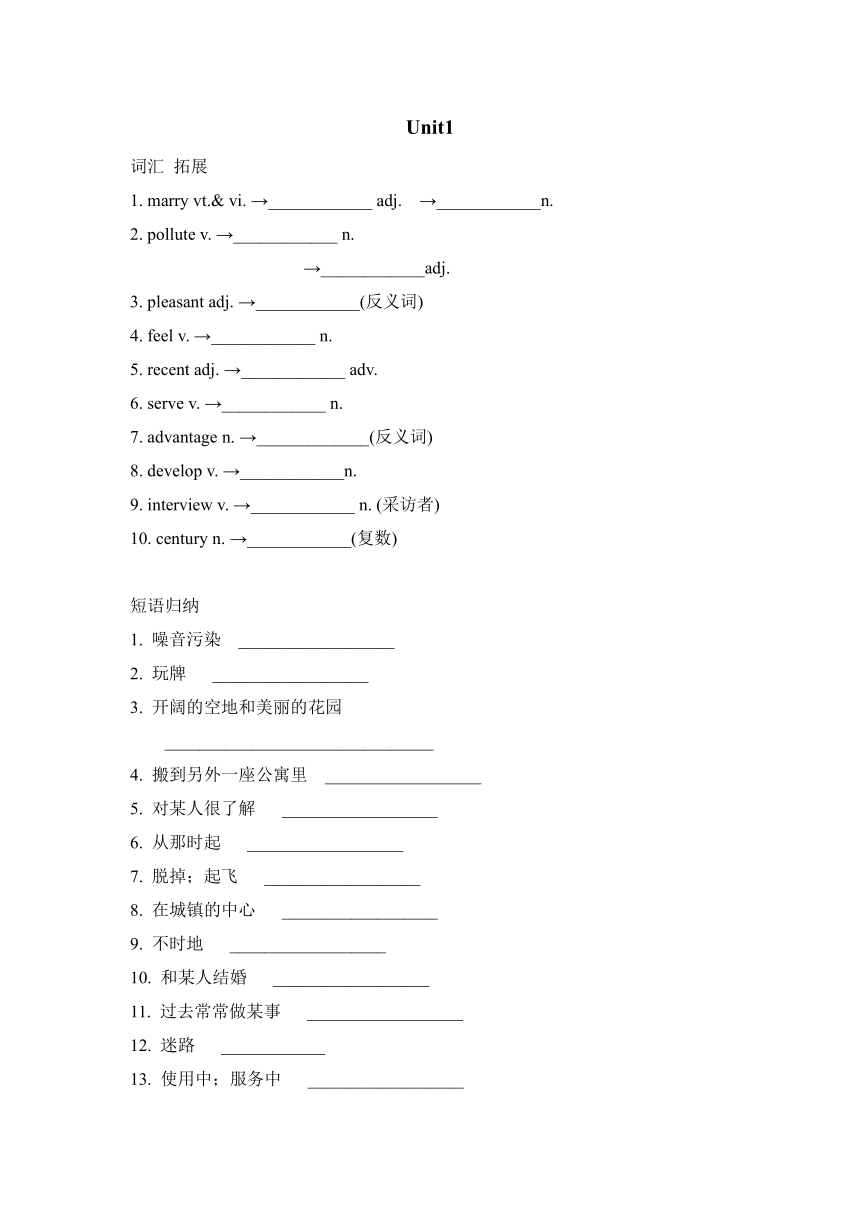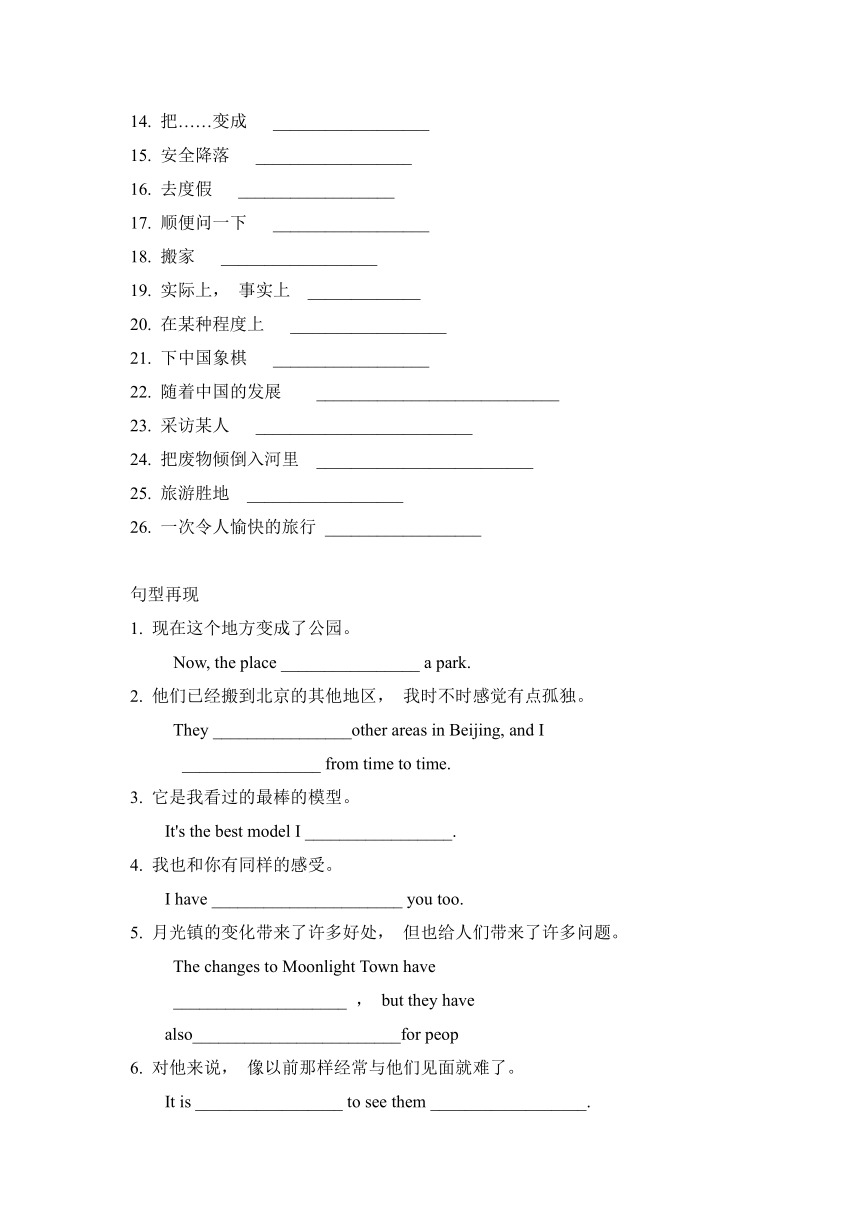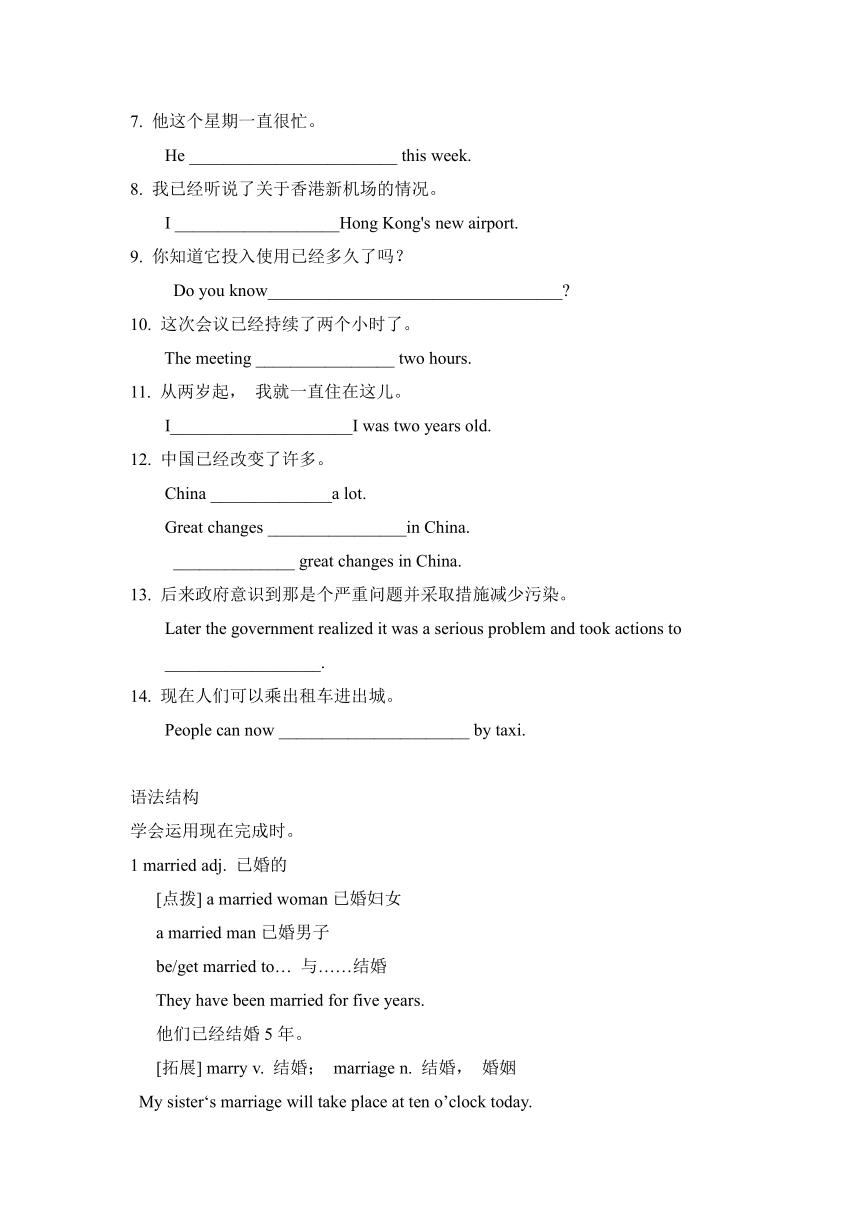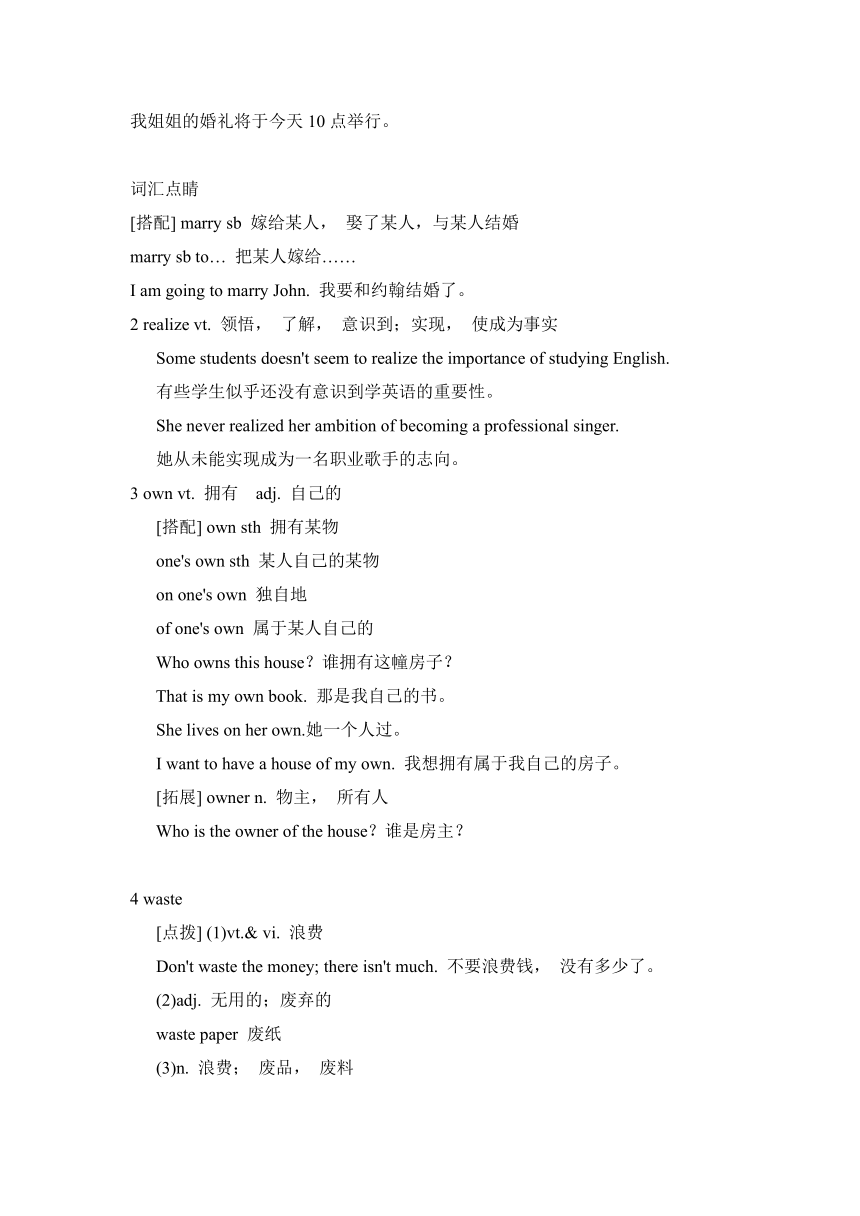牛津译林版八年级英语下册Unit1 Past and Present知识点复习及练习(无答案)
文档属性
| 名称 | 牛津译林版八年级英语下册Unit1 Past and Present知识点复习及练习(无答案) |  | |
| 格式 | docx | ||
| 文件大小 | 23.1KB | ||
| 资源类型 | 教案 | ||
| 版本资源 | 牛津译林版 | ||
| 科目 | 英语 | ||
| 更新时间 | 2024-05-14 21:34:28 | ||
图片预览




文档简介
Unit1
词汇 拓展
1. marry vt.& vi. →____________ adj. →____________n.
2. pollute v. →____________ n.
→____________adj.
3. pleasant adj. →____________(反义词)
4. feel v. →____________ n.
5. recent adj. →____________ adv.
6. serve v. →____________ n.
7. advantage n. →_____________(反义词)
8. develop v. →____________n.
9. interview v. →____________ n. (采访者)
10. century n. →____________(复数)
短语归纳
1. 噪音污染 __________________
2. 玩牌 __________________
3. 开阔的空地和美丽的花园
_______________________________
4. 搬到另外一座公寓里 __________________
5. 对某人很了解 __________________
6. 从那时起 __________________
7. 脱掉;起飞 __________________
8. 在城镇的中心 __________________
9. 不时地 __________________
10. 和某人结婚 __________________
11. 过去常常做某事 __________________
12. 迷路 ____________
13. 使用中;服务中 __________________
14. 把……变成 __________________
15. 安全降落 __________________
16. 去度假 __________________
17. 顺便问一下 __________________
18. 搬家 __________________
19. 实际上, 事实上 _____________
20. 在某种程度上 __________________
21. 下中国象棋 __________________
22. 随着中国的发展 ____________________________
23. 采访某人 _________________________
24. 把废物倾倒入河里 _________________________
25. 旅游胜地 __________________
26. 一次令人愉快的旅行 __________________
句型再现
1. 现在这个地方变成了公园。
Now, the place ________________ a park.
2. 他们已经搬到北京的其他地区, 我时不时感觉有点孤独。
They ________________other areas in Beijing, and I
________________ from time to time.
3. 它是我看过的最棒的模型。
It's the best model I _________________.
4. 我也和你有同样的感受。
I have ______________________ you too.
5. 月光镇的变化带来了许多好处, 但也给人们带来了许多问题。
The changes to Moonlight Town have
____________________ , but they have also________________________for peop
6. 对他来说, 像以前那样经常与他们见面就难了。
It is _________________ to see them __________________.
7. 他这个星期一直很忙。
He ________________________ this week.
8. 我已经听说了关于香港新机场的情况。
I ___________________Hong Kong's new airport.
9. 你知道它投入使用已经多久了吗?
Do you know__________________________________
10. 这次会议已经持续了两个小时了。
The meeting ________________ two hours.
11. 从两岁起, 我就一直住在这儿。
I_____________________I was two years old.
12. 中国已经改变了许多。
China ______________a lot.
Great changes ________________in China.
______________ great changes in China.
13. 后来政府意识到那是个严重问题并采取措施减少污染。
Later the government realized it was a serious problem and took actions to __________________.
14. 现在人们可以乘出租车进出城。
People can now ______________________ by taxi.
语法结构
学会运用现在完成时。
1 married adj. 已婚的
[点拨] a married woman已婚妇女
a married man已婚男子
be/get married to… 与……结婚
They have been married for five years.
他们已经结婚5年。
[拓展] marry v. 结婚; marriage n. 结婚, 婚姻
My sister‘s marriage will take place at ten o’clock today.
我姐姐的婚礼将于今天10点举行。
词汇点睛
[搭配] marry sb 嫁给某人, 娶了某人,与某人结婚
marry sb to… 把某人嫁给……
I am going to marry John. 我要和约翰结婚了。
2 realize vt. 领悟, 了解, 意识到;实现, 使成为事实
Some students doesn't seem to realize the importance of studying English.
有些学生似乎还没有意识到学英语的重要性。
She never realized her ambition of becoming a professional singer.
她从未能实现成为一名职业歌手的志向。
3 own vt. 拥有 adj. 自己的
[搭配] own sth 拥有某物
one's own sth 某人自己的某物
on one's own 独自地
of one's own 属于某人自己的
Who owns this house?谁拥有这幢房子?
That is my own book. 那是我自己的书。
She lives on her own.她一个人过。
I want to have a house of my own. 我想拥有属于我自己的房子。
[拓展] owner n. 物主, 所有人
Who is the owner of the house?谁是房主?
4 waste
[点拨] (1)vt.& vi. 浪费
Don't waste the money; there isn't much. 不要浪费钱, 没有多少了。
(2)adj. 无用的;废弃的
waste paper 废纸
(3)n. 浪费; 废品, 废料
It's a waste of time. 这是浪费时间。
It is a waste to throw away good food. 把好的食物扔掉是浪费。
The waste from the factory was taken away in trucks.
工厂的废料被装在大卡车里运走。
巧辨异同
1 lonely 和alone
(1)lonely adj. 孤独的;寂寞的;无人烟的, 荒凉的。
live a lonely life 过着孤单生活
a lonely old man 一位孤独的老人
feel lonely 感到孤独
a lonely island 一个孤岛
After his wife and two children left him, he was very lonely.
妻子和两个孩子离他而去后, 他很孤独。
(2)alone adj. 只作表语, 单独的, 独自的;独一无二的。
He was alone in the house. 他独自一人在家里。
I am not alone in thinking so.
并非只有我才这样想的。
alone adv. 单独地, 独自地
He went home alone. 他独自一人回家去了。
She lived alone. 她独居。
2 ago和before
ago和before都可以作副词, 放在表示一段时间的名词短语后,意为“……以前”, 但时间概念的内涵完全不同。
(1)ago的时间起点是现在或说话的当时, 通常与一般过去时连用。
She left 30 minutes ago. 她30分钟前离开了。
(2)before通常用来表示“过去”或“将来”的某个时间点之前, 通常与过去完成时或现在完成时连用。
I have never met him before. 以前我从来没有见过他。
He had left before I arrived. 在我到之前, 他已经离开了。
句型透视
1 Things have changed a lot over the years! 这些年, 事物发生了很大的变化。
[点拨] 句中over是介词, 意为“在……期间”。over有很多种用法:
(1)上方;在……上面。
The lamp hung over the table. 那盏灯悬挂在桌子上方。
(2)跳过;跳到;跳上。
Can you jump over the wall?你能跳过这堵墙吗?
(3)横跨, 横越。
The ball rolled over the grass. 球滚过草地。
(4)遍及。
They travelled all over Europe.他们游遍了欧洲。
(5)多于;超过。
There are over 20 books on the desk.桌子上有20多本书。
(6)通过。
He spoke to me over the telephone.他用电话跟我说话。
2 I feel a bit lonely from time to time. 我时不时地感到有点儿孤独。
[点拨] (1)from time to time=at times=sometimes 有时;不时地
(2)a little/a bit/a little bit +形容词, 表示“有点……”;
He's a little better this morning. 他今天早晨稍微好了一些。
a bit of+不可数名词=a little+不可数名词,表示“一点……”。
He speaks a little French. 他会讲一点法语。
[拓展] not a little=very非常
not a bit=not…at all一点也不
I'm not a little tired. 我非常累。
I'm not a bit tired. 我一点也不累。
3 It's the best model I have ever seen.
它是我曾见过的最好的模型。
[点拨] (1)“the+形容词最高级+名词单数+(that)sb have/has
ever done”表示“某人曾做过的最……的……”。
This is the most wonderful football match(that)he has ever watched.
这是他看过的最精彩的足球赛。It is one of the ugliest faces I have ever seen. 那是我看见过的最丑陋的人面像之一。
(2)ever通常用于疑问句中或否定句中。
Have/Has sb ever done sth 你曾经做过某事吗?
[拓展] ever since…意为“自从……起到现在(用于现在完成时)”, for ever=forever意为“永远;永久地”。Have you ever been to London 你曾到过伦敦吗?
Nobody has ever stepped in this cavern. 没人曾经踏进过这洞穴。
I shall remember that happy day forever. 我将永远记住那快乐的一天。
即时自测
单项填空
1. My uncle ________ for three years.
A. married B. got married
C. was married D. has been married
2. I didn't ________ you were going to leave ________ 3 o'clock.
A. find; at B. realize; until
C. remember; before D. tell; after
3. We have studied English since five years ________.
A. before B. ago C. on D. in
4. Qingdao will spend about 80,000,000 yuan in building a
bridge________ the sea.
A. over B. on C. in D. above
5. The old man lives ________ in the country, but he doesn't feel
________ at all.
A. alone; lonely B. lonely; lonely C. alone; alone D. lonely; alone
6. —Nancy! You have straight hair!
—Yeah, it________be curly hair.
A. wanted to B. loved to
C. used to D. helped to
词汇 拓展
1. marry vt.& vi. →____________ adj. →____________n.
2. pollute v. →____________ n.
→____________adj.
3. pleasant adj. →____________(反义词)
4. feel v. →____________ n.
5. recent adj. →____________ adv.
6. serve v. →____________ n.
7. advantage n. →_____________(反义词)
8. develop v. →____________n.
9. interview v. →____________ n. (采访者)
10. century n. →____________(复数)
短语归纳
1. 噪音污染 __________________
2. 玩牌 __________________
3. 开阔的空地和美丽的花园
_______________________________
4. 搬到另外一座公寓里 __________________
5. 对某人很了解 __________________
6. 从那时起 __________________
7. 脱掉;起飞 __________________
8. 在城镇的中心 __________________
9. 不时地 __________________
10. 和某人结婚 __________________
11. 过去常常做某事 __________________
12. 迷路 ____________
13. 使用中;服务中 __________________
14. 把……变成 __________________
15. 安全降落 __________________
16. 去度假 __________________
17. 顺便问一下 __________________
18. 搬家 __________________
19. 实际上, 事实上 _____________
20. 在某种程度上 __________________
21. 下中国象棋 __________________
22. 随着中国的发展 ____________________________
23. 采访某人 _________________________
24. 把废物倾倒入河里 _________________________
25. 旅游胜地 __________________
26. 一次令人愉快的旅行 __________________
句型再现
1. 现在这个地方变成了公园。
Now, the place ________________ a park.
2. 他们已经搬到北京的其他地区, 我时不时感觉有点孤独。
They ________________other areas in Beijing, and I
________________ from time to time.
3. 它是我看过的最棒的模型。
It's the best model I _________________.
4. 我也和你有同样的感受。
I have ______________________ you too.
5. 月光镇的变化带来了许多好处, 但也给人们带来了许多问题。
The changes to Moonlight Town have
____________________ , but they have also________________________for peop
6. 对他来说, 像以前那样经常与他们见面就难了。
It is _________________ to see them __________________.
7. 他这个星期一直很忙。
He ________________________ this week.
8. 我已经听说了关于香港新机场的情况。
I ___________________Hong Kong's new airport.
9. 你知道它投入使用已经多久了吗?
Do you know__________________________________
10. 这次会议已经持续了两个小时了。
The meeting ________________ two hours.
11. 从两岁起, 我就一直住在这儿。
I_____________________I was two years old.
12. 中国已经改变了许多。
China ______________a lot.
Great changes ________________in China.
______________ great changes in China.
13. 后来政府意识到那是个严重问题并采取措施减少污染。
Later the government realized it was a serious problem and took actions to __________________.
14. 现在人们可以乘出租车进出城。
People can now ______________________ by taxi.
语法结构
学会运用现在完成时。
1 married adj. 已婚的
[点拨] a married woman已婚妇女
a married man已婚男子
be/get married to… 与……结婚
They have been married for five years.
他们已经结婚5年。
[拓展] marry v. 结婚; marriage n. 结婚, 婚姻
My sister‘s marriage will take place at ten o’clock today.
我姐姐的婚礼将于今天10点举行。
词汇点睛
[搭配] marry sb 嫁给某人, 娶了某人,与某人结婚
marry sb to… 把某人嫁给……
I am going to marry John. 我要和约翰结婚了。
2 realize vt. 领悟, 了解, 意识到;实现, 使成为事实
Some students doesn't seem to realize the importance of studying English.
有些学生似乎还没有意识到学英语的重要性。
She never realized her ambition of becoming a professional singer.
她从未能实现成为一名职业歌手的志向。
3 own vt. 拥有 adj. 自己的
[搭配] own sth 拥有某物
one's own sth 某人自己的某物
on one's own 独自地
of one's own 属于某人自己的
Who owns this house?谁拥有这幢房子?
That is my own book. 那是我自己的书。
She lives on her own.她一个人过。
I want to have a house of my own. 我想拥有属于我自己的房子。
[拓展] owner n. 物主, 所有人
Who is the owner of the house?谁是房主?
4 waste
[点拨] (1)vt.& vi. 浪费
Don't waste the money; there isn't much. 不要浪费钱, 没有多少了。
(2)adj. 无用的;废弃的
waste paper 废纸
(3)n. 浪费; 废品, 废料
It's a waste of time. 这是浪费时间。
It is a waste to throw away good food. 把好的食物扔掉是浪费。
The waste from the factory was taken away in trucks.
工厂的废料被装在大卡车里运走。
巧辨异同
1 lonely 和alone
(1)lonely adj. 孤独的;寂寞的;无人烟的, 荒凉的。
live a lonely life 过着孤单生活
a lonely old man 一位孤独的老人
feel lonely 感到孤独
a lonely island 一个孤岛
After his wife and two children left him, he was very lonely.
妻子和两个孩子离他而去后, 他很孤独。
(2)alone adj. 只作表语, 单独的, 独自的;独一无二的。
He was alone in the house. 他独自一人在家里。
I am not alone in thinking so.
并非只有我才这样想的。
alone adv. 单独地, 独自地
He went home alone. 他独自一人回家去了。
She lived alone. 她独居。
2 ago和before
ago和before都可以作副词, 放在表示一段时间的名词短语后,意为“……以前”, 但时间概念的内涵完全不同。
(1)ago的时间起点是现在或说话的当时, 通常与一般过去时连用。
She left 30 minutes ago. 她30分钟前离开了。
(2)before通常用来表示“过去”或“将来”的某个时间点之前, 通常与过去完成时或现在完成时连用。
I have never met him before. 以前我从来没有见过他。
He had left before I arrived. 在我到之前, 他已经离开了。
句型透视
1 Things have changed a lot over the years! 这些年, 事物发生了很大的变化。
[点拨] 句中over是介词, 意为“在……期间”。over有很多种用法:
(1)上方;在……上面。
The lamp hung over the table. 那盏灯悬挂在桌子上方。
(2)跳过;跳到;跳上。
Can you jump over the wall?你能跳过这堵墙吗?
(3)横跨, 横越。
The ball rolled over the grass. 球滚过草地。
(4)遍及。
They travelled all over Europe.他们游遍了欧洲。
(5)多于;超过。
There are over 20 books on the desk.桌子上有20多本书。
(6)通过。
He spoke to me over the telephone.他用电话跟我说话。
2 I feel a bit lonely from time to time. 我时不时地感到有点儿孤独。
[点拨] (1)from time to time=at times=sometimes 有时;不时地
(2)a little/a bit/a little bit +形容词, 表示“有点……”;
He's a little better this morning. 他今天早晨稍微好了一些。
a bit of+不可数名词=a little+不可数名词,表示“一点……”。
He speaks a little French. 他会讲一点法语。
[拓展] not a little=very非常
not a bit=not…at all一点也不
I'm not a little tired. 我非常累。
I'm not a bit tired. 我一点也不累。
3 It's the best model I have ever seen.
它是我曾见过的最好的模型。
[点拨] (1)“the+形容词最高级+名词单数+(that)sb have/has
ever done”表示“某人曾做过的最……的……”。
This is the most wonderful football match(that)he has ever watched.
这是他看过的最精彩的足球赛。It is one of the ugliest faces I have ever seen. 那是我看见过的最丑陋的人面像之一。
(2)ever通常用于疑问句中或否定句中。
Have/Has sb ever done sth 你曾经做过某事吗?
[拓展] ever since…意为“自从……起到现在(用于现在完成时)”, for ever=forever意为“永远;永久地”。Have you ever been to London 你曾到过伦敦吗?
Nobody has ever stepped in this cavern. 没人曾经踏进过这洞穴。
I shall remember that happy day forever. 我将永远记住那快乐的一天。
即时自测
单项填空
1. My uncle ________ for three years.
A. married B. got married
C. was married D. has been married
2. I didn't ________ you were going to leave ________ 3 o'clock.
A. find; at B. realize; until
C. remember; before D. tell; after
3. We have studied English since five years ________.
A. before B. ago C. on D. in
4. Qingdao will spend about 80,000,000 yuan in building a
bridge________ the sea.
A. over B. on C. in D. above
5. The old man lives ________ in the country, but he doesn't feel
________ at all.
A. alone; lonely B. lonely; lonely C. alone; alone D. lonely; alone
6. —Nancy! You have straight hair!
—Yeah, it________be curly hair.
A. wanted to B. loved to
C. used to D. helped to
